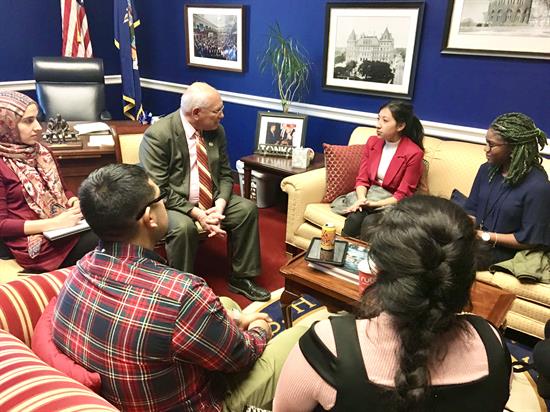- Home
- About
-
Constituent Services
- Academy Nominations
- Community Project Funding
- Congressional Art Competition
- Congressional App Challenge
- Congressional Commendation
- Event Invitation
- Grants
- Help with a Federal Agency
- Internships
- IRA Clean Energy Consumer Benefits
- Know Your Rights: Immigration
- Request a Meeting
- Request Surplus Books
- Presidential Greeting
- Visit Washington D.C.
- Issues & Legislation
- News
- 20th District
- Contact

Press Releases
Tonko, LaHood, Higgins, Cole Reintroduce Bill to Improve Care for Alzheimer’s Patients
Washington,
March 22, 2023
Washington, D.C. – U.S. Representatives Darin LaHood (IL-16), Brian Higgins (NY-26), Tom Cole (OK-04), and Paul Tonko (NY-20) introduced comprehensive legislation to help families across the country dealing with Alzheimer’s disease. H.R. 1637 - the Comprehensive Care for Alzheimer’s Act would help the 95% of individuals with dementia that have one or more other chronic conditions, such as hypertension, heart disease and diabetes. “For the millions affected by the devastating disease of Alzheimer’s, access to comprehensive, quality care can make a world of difference. Our bill takes needed action to expand and improve access for countless patients and families. I am proud to stand with my colleagues to introduce this powerful, compassionate, and bipartisan legislation, and I will continue pushing in Congress to better the lives of those living with Alzheimer’s,” said Congressman Paul Tonko. “Alzheimer's impacts millions of families throughout America and in Illinois. It is important that we continue to work to provide high quality care to individuals impacted by this disease,” said Rep. LaHood. “Our bipartisan bill will support continued innovation for Alzheimer’s treatment by the healthcare community and work to support patients, families, and caregivers through greater coordination of care.” Congressman Brian Higgins said, “The road for those diagnosed with Alzheimer’s disease and other forms of dementia is challenging enough both for patients and the people who love them. Accessing and navigating necessary care shouldn’t add to that struggle. This bill helps to remove cost and care hurdles to improve the quality of life for families living with this disease.” “By the year 2025, 76,000 Oklahomans aged 65 or older will be living with Alzheimer’s disease,” said Rep. Cole. “Since Alzheimer’s leads to other serious conditions, it is critical we provide Medicare beneficiaries with more comprehensive care and give caregivers the support and tools they need to care for their loved ones and navigate their medical care needs. I’m proud to join my colleagues in introducing this important bill that would greatly improve the quality of life for those living with this terrible disease." “The bipartisan Comprehensive Care for Alzheimer’s Act seeks to improve quality of care, ease the challenges of Alzheimer’s caregiving and reduce costs,” said Robert Egge, Alzheimer’s Association chief public policy officer and AIM executive director. “We are grateful to Reps. Darin LaHood, Brian Higgins, Tom Cole and Paul Tonko for their bipartisan leadership on this critical legislation. Our nation must streamline today’s complicated health care maze for people living with dementia and their caregivers.” One in ten seniors in the United States struggles with Alzheimer’s disease, and that number is expected to double to 14 million Americans in the next 30 years. The bipartisan legislation aims to reduce healthcare complications for patients by creating a new way to fund dementia care through Medicare. This new model of care management can help reduce hospitalizations and emergency department visits and delay nursing home placement, which improves quality of life for patients and their families and helps dementia care be more affordable. The Comprehensive Care for Alzheimer’s Act improves the lives of those living with Alzheimer’s disease. The bill would:
|
